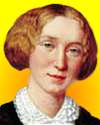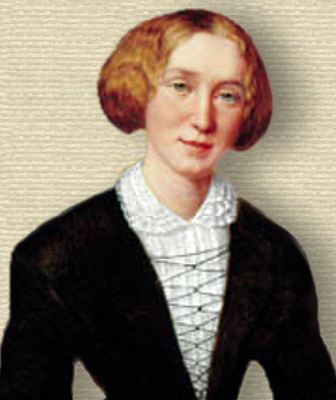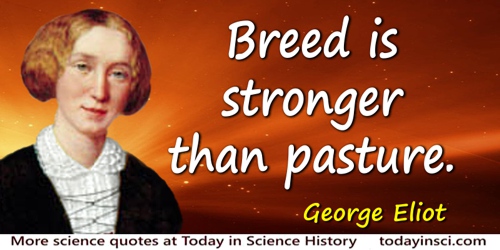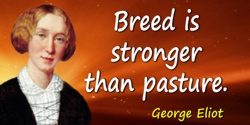 (source)
(source)
|
George Eliot
(22 Nov 1819 - 22 Dec 1880)
English novelist and journalist , the pen name of Mary Anne Evans, a leading Victorian writer, whose well-known works include major works include Adam Bede (1859), The Mill on the Floss (1860), Silas Marner (1861)and Middlemarch (1871–72). She used a male pen name to distinguish her work from the typical romantic novels usually associated with female writers of her time.
|
Science Quotes by George Eliot (11 quotes)
Animals are such agreeable friends; they ask no questions, pass no criticisms.
— George Eliot
(Mary Ann Evans, English Novelist)
Blessed is the man who, having nothing to say, abstains from giving in words evidence of the fact.
— George Eliot
(Mary Ann Evans, English Novelist)
Breed is stronger than pasture.
— George Eliot
(Mary Ann Evans, English Novelist)
Examine your words well, and you will find that even when you have no motive to be false, it is a very hard thing to say the exact truth, even about your own immediate feelings—much harder than to say something fine about them which is not the exact truth.
— George Eliot
In Adam Bede (1859, 1860), 151.
Falsehood is so easy, truth so difficult.
— George Eliot
In Adam Bede (1859, 1860), 151.
I’ve been turning it over in after-dinner speeches, but it looks awkward—it’s not what people are
used to—it wants a good deal of Latin to make it go down.
— George Eliot
From Felix Holt: The Radical (1866), Vol. 1, 59.
It is never too late to be what you might have been.
— George Eliot
…...
It’s but little good you’ll do a-watering the last year’s crop.
— George Eliot
In Adam Bede (1862), 175.
Our dead are never dead to us until we have forgotten them.
— George Eliot
In Adam Bede (1859, 1860), 89.
Science is properly more scrupulous than dogma. Dogma gives a charter to mistake, but the very breath of science is a contest with mistake, and must keep the conscience alive.
— George Eliot
In Middlemarch: A Study of Provincial Life (1873), 255.
When God makes his presence felt through us, we are like the burning bush: Moses never took any heed what sort of bush it was—he only saw the brightness of the Lord.
— George Eliot
In Adam Bede (1859), Vol. 1, 167.





 In science it often happens that scientists say, 'You know that's a really good argument; my position is mistaken,' and then they would actually change their minds and you never hear that old view from them again. They really do it. It doesn't happen as often as it should, because scientists are human and change is sometimes painful. But it happens every day. I cannot recall the last time something like that happened in politics or religion.
(1987) --
In science it often happens that scientists say, 'You know that's a really good argument; my position is mistaken,' and then they would actually change their minds and you never hear that old view from them again. They really do it. It doesn't happen as often as it should, because scientists are human and change is sometimes painful. But it happens every day. I cannot recall the last time something like that happened in politics or religion.
(1987) -- 


